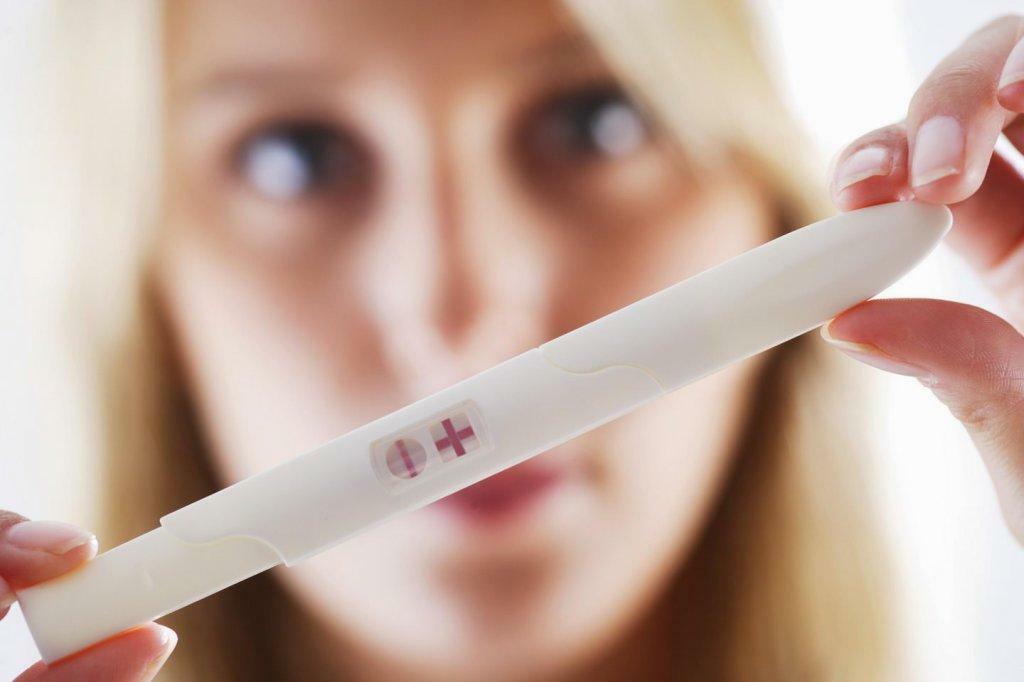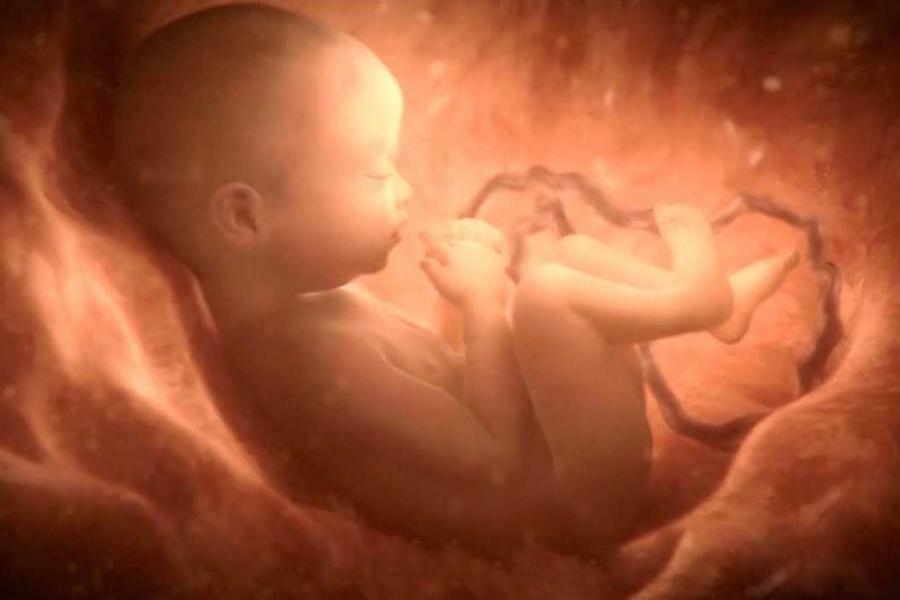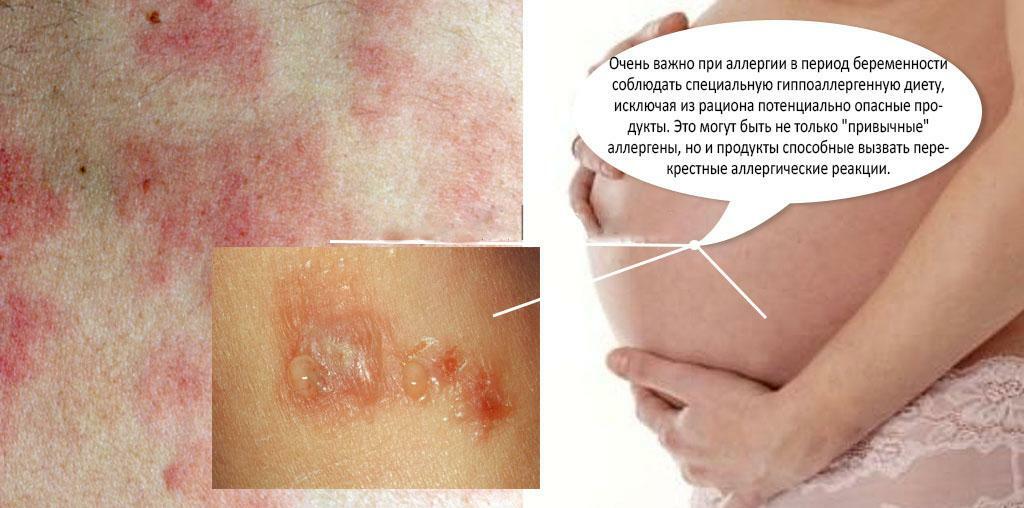Anemia is a symptom complex characterized by a spectrum of clinical and hematological manifestations, including a decrease in hemoglobin levels in the blood and a general disturbance of the person's well-being. Anemia of pregnant women is a specific syndrome that is formed during gestation, that is, the carrying of a child, and leads to various aggravating pregnancies. Most patients develop an anemia in the 2-3 trimester.
A deficiency of hemoglobin at 4-9 months of gestation is observed in 20-85% of women. The absolute majority of patients have iron deficiency anemia, in rare cases folio-deficient or hemopoietic conditions occur, that is, caused by a violation of the function of the hematopoiesis.
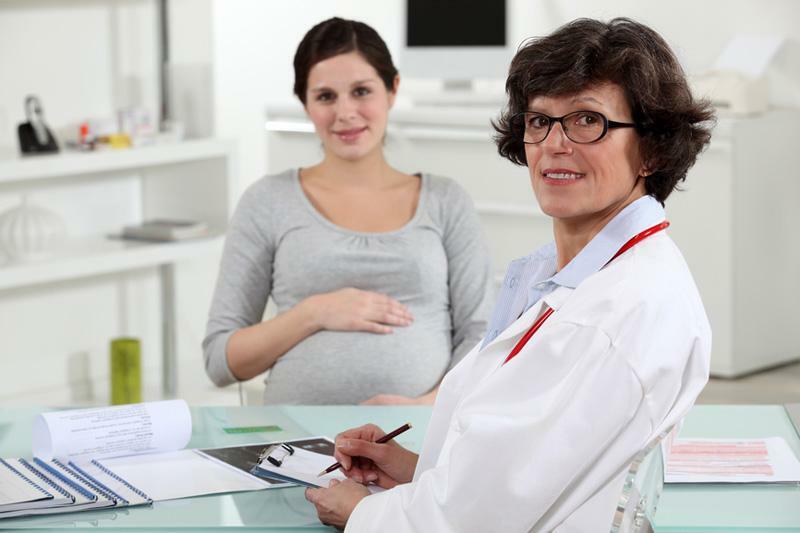
Anemia in pregnancy: consequences for the child
Attention! The death of embryos and newborns as a result of anemia of pregnant women is from 4 to 20%.In this case, congenital abnormalities in the development of infants in this case reach 17%.
Content of the material
- 1 Anemia
- 2 What is the risk of anemia in pregnancy?
- 2.1 Anemia of mild severity
- 2.2 Anemia of moderate severity
- 2.3 Anemia of severe degree
- 2.4 Video - Anemia in pregnant women
- 2.5 Video - Anemia in pregnancy
- 2.6 Video - Is it dangerous to reduce hemoglobin in pregnant women?
Anemia
Anemia classification by severity
| Indicator | Contents |
|---|---|
| Hemoglobin rate | 110-140 g / liter |
| Light degree | 91-110 g / liter |
| Average severity | 71-90 g / liter |
| Severe anemia | 41-70g / liter |
| Extremely heavy | Less than 40 g / liter |
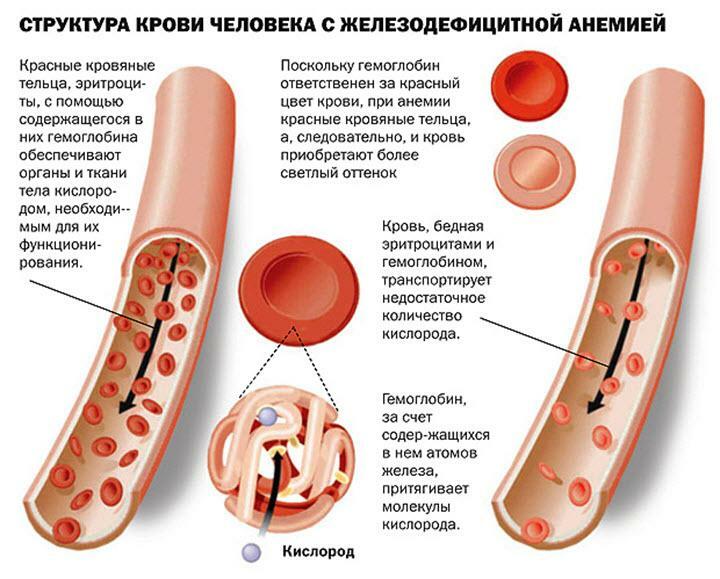
Structure of blood in iron deficiency anemia
There are two main types of iron deficiency anemia:
- general anamnesis - develops when oxygen transport of blood cells is disturbed;
- sideropenic - is formed as a result of anomalies in the process of assimilation of iron by the human body.
When anemia develops, the patient is concerned about weakness and drowsiness, dizziness, falling blood pressure and cephalalgia. As the disease develops, there are also external manifestations of pathology: dryness and pallor of the skin, brittle hair and nails, the appearance of a bluish shade of sclera, cyanotic lips and nails.
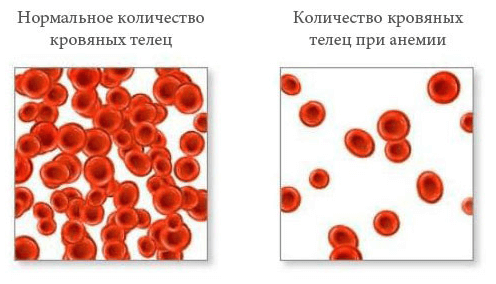
The number of blood corpuscles in case of anemia
In addition, this pathology can be manifested by nonspecific symptoms:
- unpleasant sensations, irritation of pharynx during ingestion of food;
- abdominal pain;
- stool disorders;
- spasms in the calves;
- tremor of the extremities.
Warning! In pregnant women anemia adversely affects the functioning of the placenta and blood vessels, which ensure blood exchange between the mother and the fetus. With such a violation, the risk of miscarriage or premature birth increases dramatically.

Symptoms of anemia
What is the risk of anemia in pregnancy?
Anemia during gestation develops as a result of the fact that the amount of blood in a woman's body increases rapidly, and the number of oxygen-carrying blood cells remains the same. Deficiency of erythrocytes and, accordingly, hemoglobin, leads to hypoxia of various organs and tissues, including the placenta. This condition is dangerous for the pregnant woman herself and for the fetus. An easy degree of pathology often provokes toxicosis in the 2-3 trimester. Fits of vomiting and aversion to food lead to a deficiency of nutrients in the patient's body and an even greater aggravation of anemia.
In addition, deficiency of blood elements in anemia of pregnant women leads to a violation of coagulation, which threatens bleeding during labor, violation of labor and other abnormalities. In the postpartum period, the presence of anemia in a woman causes a delay in lactation or complete absence of milk.

Pathogenesis of anemia in pregnancy
In children, whose mothers suffered from hemoglobin deficiency, there is a delay in growth and physical development, pallor of the skin, fragility of bones. Often, such newborns need additional rehabilitation and placement in kuvez - a special device with automatic oxygen supply.
Anemia of mild severity
About 80% of women during gestation suffer from iron deficiency in the body. Most of them have anemia of mild or first degree. Such pathology does not pose a threat to the life of the mother or fetus, but requires a woman to maintain a special diet to maintain normal hemoglobin levels. This form of anemia is diagnosed when its amount is less than 110 g / liter. At the first stage, the symptomatology of the pathology is rather rare.

Mechanism of anemia in pregnancy
Attention! Diagnosing anemia at an early stage allows a timely blood test. That's why pregnant women need to regularly visit a doctor and take the necessary tests.
Lack of oxygen and deficiency of blood cells leads to a general hypoxia of the woman's body. Against the backdrop of slowed blood flow, a woman and a child develop mild intoxication.

What types of anemia can occur in women
Clinically, this condition is manifested by the following symptoms:
- a small delay in fetal development;
- appearance of symptoms of toxicosis in the 2nd and 3rd trimester of gestation: nausea, vomiting in the morning, acute perception of odors and sounds;
- premature discharge of amniotic fluid;
- low birth weight of the newborn;
- weakness of labor, which leads to prolonged labor and development of fetal hypoxia;
- deficiency of nutrients coming through the placenta to the fetus;
- weakened immunity of the newborn.

Adverse effects of anemia in pregnancy
Anemia of the first degree is easily amenable to correction and, with proper treatment, does not have a pronounced deleterious effect on the fetus. To increase the level of hemoglobin, the expert recommends that the patient often go to the fresh air, adhere to the principles of rational nutrition and take vitamins and iron-containing preparations in small dosages, for example, Sorbifer, Totema.
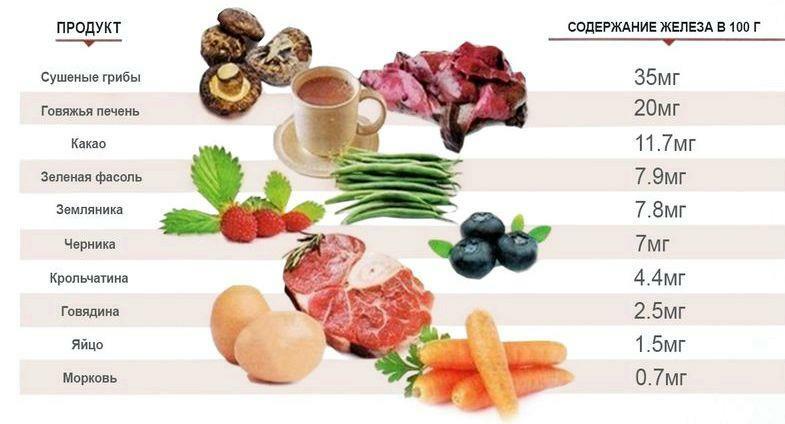
Products with high iron content
Attention! In some cases, pharmacological agents containing iron can cause constipation. If the chair is disturbed, it is recommended to reduce the dose of the medicine and introduce into the diet loosening products: plums, decoction of flaxseeds, beetroot.
Anemia of moderate severity
Anemia of the second or moderate severity severely affects the condition of both the pregnant woman and the child. This condition is diagnosed when the hemoglobin content in the blood is 90 g / liter or less. The patient begins to experience constant weakness, drowsiness. She may have pain in the stomach of a pulling or aching character. Often it is these symptoms that force the pregnant woman to seek advice from a specialist.
Warning! Deficiency of hemoglobin of the second degree is subject only to drug treatment. It is not possible to correct the patient's condition with the help of a power change.

Complications of iron deficiency anemia in pregnancy
When the concentration of hemoglobin is lower than 90 g / liter, there is a violation of blood flow in the vessels of the placenta, the child ceases to receive the necessary amount of nutrients and oxygen. Anemia causes placental dystrophy, which can lead to premature aging, early onset of labor and bleeding.
In addition, the state of the embryo is adversely affected by the process of intoxication that develops in the body of a woman. This pathology rarely leads to fetal death, but can cause a number of different disorders affecting the development of the embryo:
- violation of the formation of tissues and embryo organs;
- deviations in the development of the nervous system;
- delayed growth and development of the fetus;
- weak mobility of the embryo;
- placental insufficiency - a condition in which there is acute oxygen starvation of the embryo, fraught with a subsequent disruption of the central nervous system.

Complications of folic deficiency anemia in pregnancy
Since the fetus does not receive the required amount of oxygen and various substances for normal growth and development, after birth, the child also has some health problems:
- rapid body weight loss in the first few days of life;
- is an inborn anemia;
- abnormalities in the functioning of the heart and blood vessels;
- malfunction of the respiratory system, the development of pneumonia;
- slowed down physical and intellectual development;
- disorders of the nervous system, convulsive syndrome, epilepsy;
- internal hypoplasia;
It should be noted that some violations can be detected immediately after the birth of the child, while others are diagnosed only during its development. It is often impossible to guess which pathologies can develop in children as a result of anemia. Such infants usually have a weakened immune system, which leads to the frequent occurrence of respiratory diseases, the development of infectious and inflammatory processes.

Iron for oral administration
Attention! Anemia of moderate severity requires mandatory pharmacological administration and regular medical supervision. Correctly selected treatment allows to minimize the risks of complications for mother and child.
Severe anemia
The most severe in gestation is anemia of the third degree. The patient has a hemoglobin content of less than 70 g / liter. Pregnant in this state requires hospitalization and being under close supervision of specialists. Reduction of hemoglobin to such low levels is a threat to the health and life of both the patient and the fetus. If severe anemia is detected immediately before childbirth, in most cases a caesarean section is prescribed to avoid the development of profuse bleeding and the death of the mother and child.

The cause of anemia
The presence of a severe form of anemia in a pregnant woman leads to the development of the following complications during gestation:
- threat of termination of pregnancy;
- premature labor, the outflow of water;
- placental abruption;
- acute oxygen starvation of the fetus;
- stop of labor;
- underdevelopment of fetal organs and systems, including central nervous and cardiovascular systems;
- severe defects and developmental disorders of the fetus;
- premature delivery;
- abundant uterine bleeding;
- miscarriages.
So severe anemia is extremely detrimental to the health of the newborn. Infants are noted for breathing disorders, convulsive seizures, violation of the sucking reflex, dysfunction of the gastrointestinal tract and a number of other abnormalities. When a child is clinically examined, the doctor notes his small height and weight, thinning of the skin. Most newborns in this case require the help of resuscitators.
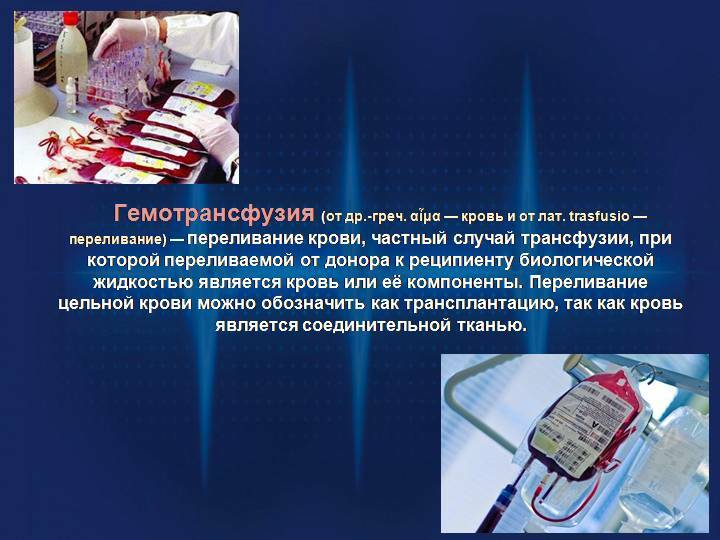
Blood Transfusion
Therapy of anemia of the third degree of severity includes the complex use of iron-containing drugs in tablets or injections, blood transfusion, drip saline administration, etc.
Anemia of extreme severity in patients is diagnosed in a single percentage of cases. This condition develops in women against secondary pathologies: uterine or other internal bleeding, oppression of the function of the organs of hematopoiesis, severe illnesses and other body disorders. Pregnancy with this form of anemia can not be maintained.

Anemia prophylaxis
Anemia during gestation is one of the most common pathological conditions that arises because of the increased amount of blood in the body of a woman and the lack of shaped blood cells. With timely diagnosis, this disorder successfully responds to therapy and does not have serious consequences on the health and development of the child.

